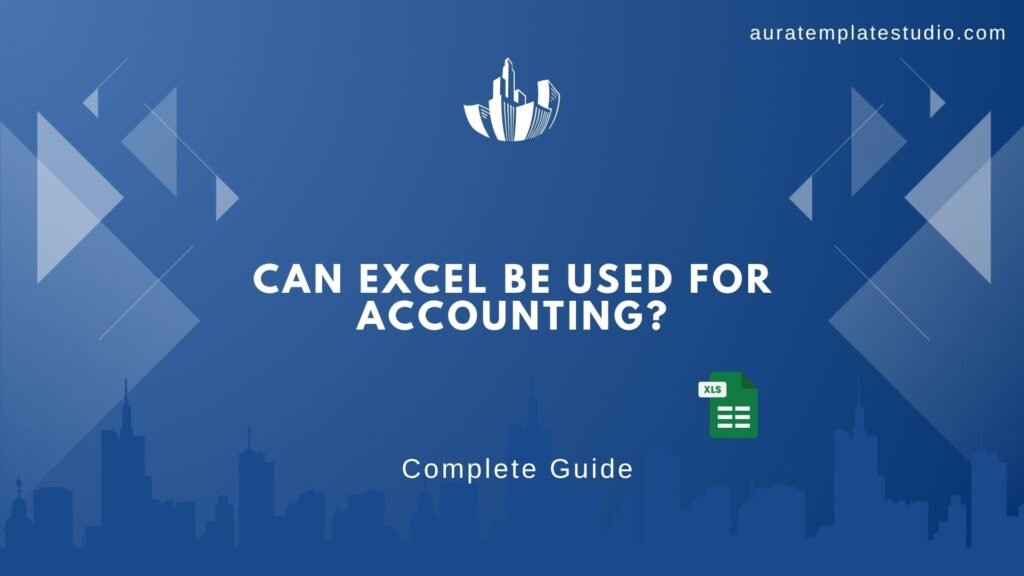
Microsoft Excel is great for accounting. It’s perfect for small businesses, freelancers, and anyone handling personal finances. Excel won’t replace full accounting software, but it has many features. These make it a useful tool for different accounting tasks.
What Does It Mean to Use Excel for Accounting?
Using Excel for accounting means using spreadsheets to record, organize, and analyze finances. This includes tasks like budgeting, tracking expenses and income, making financial statements, and doing financial analysis. Excel’s flexibility allows users to customize spreadsheets to fit their specific accounting needs.

Excel is a lightweight and customizable alternative to accounting software. This makes it great for freelancers, startups, and small business owners. It gives you full control over how your financial tracking system is set up and works.
Why Excel Is Important for Accounting?
Excel’s significance in accounting stems from its versatility and powerful features:
- Data Organization: Excel lets you enter data in a structured way. This makes it simple to sort and manage financial info.
- Automated Calculations: Excel has built-in formulas and functions. They can do complex calculations automatically. This helps cut down on manual errors.
- Financial Analysis Tools: Features like pivot tables and charts help users analyze financial data. They also make it easier to spot trends.
- Customization: Users can tailor spreadsheets to their specific requirements, creating templates for recurring tasks.
- Cost-Effective: Excel offers a cost-effective option for small businesses and individuals, unlike pricey accounting software.
Free Excel Templates for Accounting
Several free Excel templates are available to assist with accounting tasks:
- Microsoft Office Templates: Microsoft offers a large collection of ready-to-use Excel templates for accounting and bookkeeping tasks. No matter if you’re handling your budget or a small business’s finances, many options exist.
- Smartsheet: Smartsheet provides free downloadable Excel templates focused on more structured business accounting and reporting. Their library is great for startups, finance teams, and anyone needing ready-to-use templates.
- Beginner Bookkeeping: Beginner Bookkeeping specializes in simple, practical Excel accounting templates aimed at individuals, freelancers, and small businesses. The templates are beginner-friendly and come with instructions.
Benefits of Using Excel for Accounting
Utilizing Excel for accounting offers several advantages:
- Flexibility and Customization: Excel gives you complete control over how you structure your accounting system. You can create custom spreadsheets for your business. This works for tracking income and expenses, client billing, or employee payroll. Your data can look any way you want. This is different from fixed-format accounting software, which has strict rules.
- Cost-Effective Solution: Excel is a cost-effective choice for small businesses, startups, freelancers, or personal use. It’s a great alternative to pricey accounting software. If you already have a Microsoft 365 subscription, you don’t need to spend extra. You can find many free templates and resources online to help you begin.
- Data Automation with Formulas: Excel’s strong formulas like SUM, IF, VLOOKUP, XLOOKUP, and INDEX-MATCH help you automate tasks. You can easily calculate totals, create reports, and track balances. This saves time, reduces repetitive work, and minimizes errors associated with manual calculations.
- Financial Analysis Capabilities: Excel goes beyond basic accounting by enabling in-depth analysis. Tools like pivot tables, conditional formatting, and charts help you analyze trends. They also let you monitor KPIs and spot potential financial issues quickly.
Excel for Accounting – 10 Excel Functions You NEED to KNOW!
FAQ’s
Can Excel handle double-entry bookkeeping?
Yes, Excel can handle double-entry bookkeeping. You can use different sheets for debits and credits. Just make sure the accounting equation stays balanced.
Is Excel suitable for large businesses?
Excel is powerful. However, larger businesses with complex accounting needs may benefit more from specialized accounting software. This type of software offers advanced features and can grow with the business.
How secure is financial data in Excel?
Excel has password protection and encryption. You should also add extra security measures. Regularly back up your data to protect sensitive financial information.
Conclusion
Microsoft Excel is a useful tool for accounting. It helps individuals and small businesses find a flexible and affordable solution. Its features help with many accounting tasks, from simple bookkeeping to financial analysis. As business needs grow, it’s key to check if you need dedicated accounting software. This can help meet more complex requirements.
